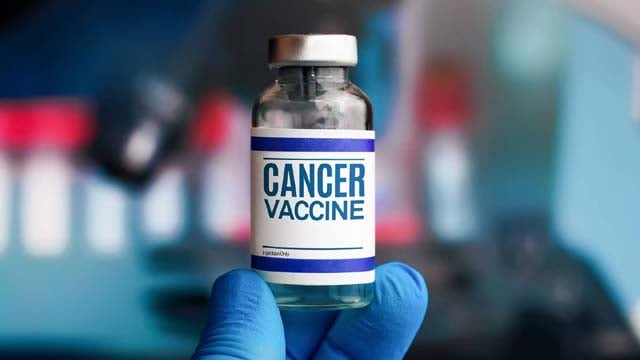
Russia’s Cancer Vaccine: A Revolutionary Step in Oncology
Cancer remains one of the most significant health challenges globally, with millions of lives impacted each year. However, a groundbreaking development from Russia could signal a paradigm shift in how we approach cancer treatment. The Russian government has announced the creation of an mRNA-based cancer vaccine, set to be made available to patients free of charge starting in early 2025. This remarkable innovation aims to enhance personalized medicine by leveraging cutting-edge technology, including artificial intelligence, to revolutionize cancer care.
(Facebook: Like, X: Follow, Telegram: Join us)
The Development of Russia’s Cancer Vaccine

The Russian vaccine employs messenger RNA (mRNA) technology, a method that gained widespread recognition during the COVID-19 pandemic. This platform allows for the creation of vaccines that instruct the body’s cells to produce antigens, triggering an immune response. In the case of this cancer vaccine, the mRNA instructs the immune system to identify and destroy cancer cells, offering a targeted approach to treatment.
The vaccine’s development involved close collaboration between researchers and artificial intelligence systems, which streamlined the process of personalizing vaccine formulas. Reports suggest that the AI technology can tailor the vaccine for individual patients within an hour, allowing for faster and more accurate treatment.
How It Works

Russia’s cancer vaccine is designed to:
- Identify Tumor-Specific Antigens: Using advanced molecular profiling, the vaccine identifies unique markers on cancer cells.
- Enhance Immune Recognition: By encoding these antigens into the mRNA, the vaccine trains the immune system to recognize and attack cancer cells.
- Prevent Metastases: Early trials indicate that the vaccine may suppress tumor growth and reduce the spread of cancer to other parts of the body.
This approach aligns with the broader shift in oncology toward precision medicine, where treatments are tailored to the genetic and molecular characteristics of individual tumors.
Pre-Clinical Success and Clinical Trials

Pre-clinical studies of the vaccine have demonstrated promising results, including:
- Suppression of tumor growth in lab models.
- Reduction in the likelihood of metastasis.
- Activation of robust immune responses without significant side effects.
However, the vaccine’s clinical trial data has not yet been fully published, leaving many in the scientific community eager to evaluate its efficacy and safety rigorously. The transition from laboratory success to clinical application is critical, and further trials will determine whether the vaccine lives up to its early promise.
What Sets This Vaccine Apart?

Several features make Russia’s cancer vaccine a potential game-changer:
- Free Distribution: In a bold move, the Russian government plans to make the vaccine available at no cost to patients, ensuring accessibility regardless of economic status.
- Rapid Customization: The use of AI allows for near-instant personalization, enabling oncologists to create patient-specific vaccines within hours.
- Focus on Treatment Over Prevention: Unlike traditional vaccines that prevent disease, this mRNA vaccine is designed for patients already diagnosed with cancer, targeting their specific tumors.
Global Implications

If successful, Russia’s cancer vaccine could have far-reaching implications:
- Advancing mRNA Technology: Building on the success of COVID-19 vaccines, this innovation could inspire further research into mRNA-based treatments for other diseases.
- Improving Cancer Outcomes: By offering a more targeted and effective treatment, the vaccine could significantly improve survival rates and quality of life for cancer patients.
- Setting a Global Standard: The decision to provide the vaccine for free could pressure other countries to adopt similar models, increasing accessibility to life-saving treatments.
Skepticism and Challenges
Despite its potential, the vaccine has been met with cautious optimism. Experts have raised concerns about:
- Lack of Published Data: The absence of peer-reviewed clinical trial results makes it difficult to assess the vaccine’s true efficacy and safety.
- Scalability: Customizing vaccines for individual patients may present logistical challenges, particularly in regions with limited healthcare infrastructure.
- Long-Term Effects: As with any new medical intervention, the long-term effects of the vaccine remain unknown and require thorough investigation.
Comparisons to Other Cancer Treatments
While the vaccine is innovative, it enters a competitive landscape that includes:
- Immunotherapy: Treatments like checkpoint inhibitors and CAR-T cells, which also aim to harness the immune system.
- Targeted Therapy: Drugs that focus on specific genetic mutations in cancer cells.
- Traditional Approaches: Chemotherapy and radiation, which remain mainstays of cancer treatment.
The ability of Russia’s cancer vaccine to complement or surpass these existing modalities will be a key factor in its success.
FAQs
How does Russia’s cancer vaccine work?
The vaccine uses mRNA technology to train the immune system to recognize and attack cancer cells based on tumor-specific antigens.
When will the vaccine be available?
The vaccine is expected to be distributed to patients for free starting in early 2025.
Has the vaccine been tested in clinical trials?
While pre-clinical results are promising, clinical trial data has not yet been fully published, raising the need for further validation.
What types of cancer does the vaccine target?
Specific cancer types have not been disclosed, but the vaccine is designed to be personalized for individual patients.
What makes this vaccine different from existing treatments?
It focuses on personalized, patient-specific treatment rather than a one-size-fits-all approach.
Is the vaccine free?
Yes, the Russian government has announced that the vaccine will be provided at no cost to patients.
Conclusion
Russia’s mRNA-based cancer vaccine represents a bold and innovative step in the fight against one of humanity’s deadliest diseases. By combining cutting-edge technology with a commitment to accessibility, this development has the potential to reshape oncology. However, the road ahead is fraught with challenges, from the need for robust clinical trials to logistical hurdles in personalization and distribution.
If successful, this vaccine could mark the dawn of a new era in cancer treatment, providing hope to millions of patients worldwide.
Do Follow For More News : DailyForesight



